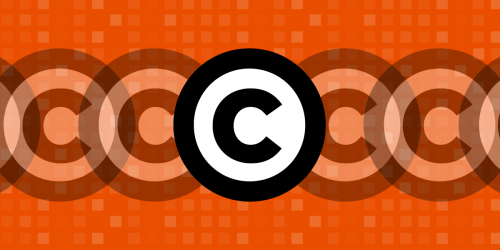Today, together with the Thomas Jefferson Center for the Protection of Freedom of Expression, EFF submitted an amicus brief in Lee v. Tam. Our brief discusses an unusual but important question: are registered trademarks government expression? It is important to get the dividing line between government and private speech correct. This is because, while the government doesn’t get to control what you say, it does get to control what it says. As we argue in our brief, categorizing registered trademarks as government expression would threaten speech in many other areas.
The case involves a rock band from California called The Slants. The band, like Dykes on Bikes®, intentionally chose a name containing a slur to reappropriate the term. The band attempted to register its name as a trademark but United States Patent and Trademark Office (PTO) refused the registration. The PTO concluded that the mark was not eligible under a statute prohibiting registration of any marks that “disparage” people. The PTO did not care how The Slants, an Asian-American band, intended for its mark to be understood. Rather, the fact that the term, standing alone, could be a slur was sufficient for it to deny registration.
The band appealed the decision to the courts, arguing that the law should be struck down as inconsistent with the First Amendment. They argue that the rule against “disparaging” trademarks is improper viewpoint discrimination by the government. In response, the PTO has claimed that it should be given wide discretion because the act of registering trademarks is government speech.
According to the PTO, trademark registration is a kind of Midas touch whereby the expressive content of the trademarks themselves becomes government expression. If this argument prevailed, it would create a dangerous precedent for all kinds of areas where the government engages in permitting and regulation. For example, a permit allowing a street march does not make the message of the protest government expression. If it did, cities and towns could quickly crack down on messages they don’t like.
There is more than a hint of absurdity to the government’s position. If it is indeed true that registered trademarks carry the imprimatur of government approval, then the United States has signed on to some quite surprising messages. You can find a registered mark that says CAPITALISM SUCKS DONKEY BALLS (perhaps while wearing a GANJA UNIVERSITY sweatshirt and sipping SATAN’S PONY beer). Does the existence of this trademark convince you that the US government has forsaken capitalism?
Ultimately, the PTO should focus not on the message of trademark applicants but on whether they have met the requirements that are actually relevant to a trademark system (E.g., is the mark distinctive? Has the applicant used the mark in commerce?). Importantly, courts still have the power to refuse trademark enforcement that would improperly burden speech by the public, such as when corporations try to shut down criticism by controlling “use” of their name (this is the trademark issue we deal with more frequently at EFF). There is no need to mischaracterize trademarks as government speech to create a system that appropriately balances the rights of mark owners and the public. We hope that the Supreme Court agrees.








